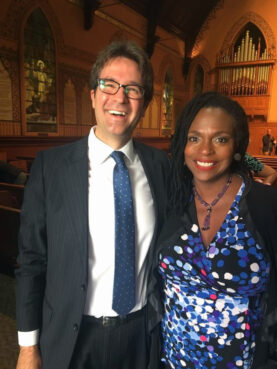(RNS) — Rebuilding is a spiritual obligation and civic opportunity. A sacred space can be far more than just an edifice when it becomes a center for activists, artists, organizers and volunteers who reach far beyond its walls.
So it had been for Middle Collegiate Church, the oldest continuously operating church in the United States, which tragically lost its sanctuary to a fire that began in the neighboring building on Dec. 5, 2020.
Now, a community that has tirelessly served others is being poorly served by local government — and could well be kept from rebuilding.
In a Kafkaesque situation, Middle Collegiate Church first spent $4 million trying to stabilize its historic front walls before learning from its architects and structural engineers that there was no safe way to keep them upright for the long term. The walls must be demolished or Middle Church cannot rebuild.
But the local preservation activist groups remain unconvinced. They are pressuring the Landmarks Preservation Commission to force Middle Collegiate Church to expend limited resources looking endlessly into alternatives that are unlikely to yield solutions. Ultimately, this activist effort could impede altogether Middle Collegiate Church’s efforts to rebuild or remain in the neighborhood. If the commission follows the groups’ advice, it may set up a historic church to be replaced by an avant-garde condominium or office building, running counter to any meaningful notion of preserving historic landmarks.
The commissioners must do better.
This is about more than a church or a façade. It’s about a community that has served New York City for hundreds of years. It’s about a mission of revolutionary love that has led that community to train more than 10,000 people in anti-racism workshops, house a soup kitchen that’s served thousands of New Yorkers in need of a warm meal, provide space for dozens of mission-driven nonprofits and serve as a beacon of values and compassion to hundreds of thousands of New Yorkers in lower Manhattan.
Right now, Middle Collegiate Church has been sharing space with East End Temple — an act itself emblematic of the higher purpose and belief in radical hospitality that both communities share. East End Temple has been something of a “tabernacle,” providing a spiritual center as the church community rebuilds. But it does not have the physical space to become the permanent home for a community as vast as Middle Collegiate Church.
Both Jewish and Christian traditions, among others, recount stories of rebuilding after devastation. Rebuilding the Temple in Jerusalem after the Babylonian Exile. Reconsecrating the Temple in Jerusalem after its abuse by idolatrous powers in the north. Reconstituting early Christianity in Galilee after it faced grave risks in other centers. The efflorescence of Jewish life in the Ottoman Empire after the Spanish Inquisition. More recently, the Southern Freedom Movement, powered by the teachings of Rabbi Jesus and the Jewish prophets.

Rabbi Joshua Stanton, left, and the Rev. Jacqui Lewis on Sept. 10, 2017, at Middle Collegiate Church in Manhattan. Photo courtesy of Joshua Stanton
We draw from these examples as we affirm: We need to rebuild Middle Collegiate Church, for its members, for the East Village and for New York City. The Landmarks Preservation Commission would do well to recognize that spaces, no matter how historic, need to serve the needs of the living.
The front walls of Middle Collegiate Church need to come down for the community to rise once again.
(Joshua Stanton is the rabbi at East End Temple in Manhattan. The views expressed in this commentary do not necessarily represent those of Religion News Service.)





